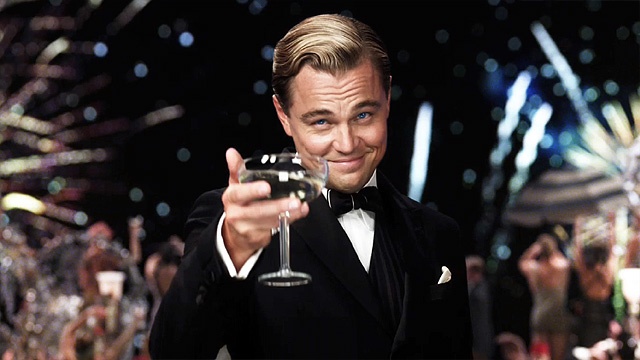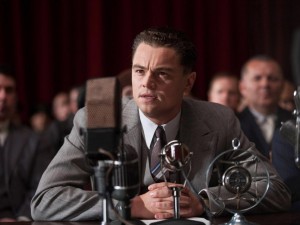Gatsby is cipher
 Even though The Great Gatsby is my favorite novel (and I’ve read it three times) I have always been left a little cold by Gatsby himself. I didn’t fall in love with him like his obsession Daisy did, and I didn’t become utterly enamored with him like the book’s narrator Nick Carraway did. This was the case for me with F. Scott Fitzgerald’s 1925 book, arguably the greatest written in English in the 20th century, in Jack Clayton and Francis Ford Coppola’s failed 1974 film with Robert Redford in the title role, and again in Baz Luhrmann’s ecstatic new adaptation starring Leonardo DiCaprio.
Even though The Great Gatsby is my favorite novel (and I’ve read it three times) I have always been left a little cold by Gatsby himself. I didn’t fall in love with him like his obsession Daisy did, and I didn’t become utterly enamored with him like the book’s narrator Nick Carraway did. This was the case for me with F. Scott Fitzgerald’s 1925 book, arguably the greatest written in English in the 20th century, in Jack Clayton and Francis Ford Coppola’s failed 1974 film with Robert Redford in the title role, and again in Baz Luhrmann’s ecstatic new adaptation starring Leonardo DiCaprio.
Gatsby is cipher; not only is everything about him concealed until the end of the book (or two-thirds of the film) but everything about his character – his affect, his accent, his trappings – are an elaborate and astonishing act. He has created a palace of wealth and excitement on Long Island across the bay from his lost love, Daisy (a luminous Carey Mulligan), all to draw her to him; he charms his much poorer next door neighbor, our narrator Nick (a most excellent Tobey Maguire), because he is Daisy’s cousin; he has constructed a false life story of well-born privilege and war heroism to give him the respectability a woman like Daisy needs. And all of it is a lie except for his desperate love for Daisy, who is married to a brute of an American aristocrat, Tom Buchanan, who Joel Edgerton’s amazingly makes more fully realized than even Fitzgerald did. Tom, after all, is the only one who sees through Gatsby’s veneer, though he of course hates what is actually underneath.
Better than anyone else has in the myriad adaptations, Dicaprio manages to play Gatsby’s complexity, by acting fake and acting real in strategic succession. His charisma, both Gatsby’s and Dicaprio’s, is admittedly powerful, but perhaps because I knew how it all would end, I couldn’t quite succumb. Perhaps it’s because Gatsby encapsulates the American Dream: the capacity for reinvention, for hope, to offer the shimmering promise of wealth, and to send us on a pursuit for happiness. And for many of us, that American Dream is bunk. Gatsby, however, never gives up hope, never sees that the green light on Daisy’s dock across the bay symbolizes too much for him, that it’s not, in the end, worth it. That’s what makes him so tragic. Fitzgerald, a heartbroken drunk, wasn’t a cheerful man.
Baz Luhrmann, however, has no such affliction. His films, the best of which are Romeo + Juliet and Moulin Rouge, are, like Gatsby, tragedies. But they are ebullient, gorgeous, lush, and enrapt tragedies, full of fauvist color, baroque styling, and anachronistic music that is less an attempt at post-modern disjuncture than a manipulation of the audience’s capacity to recall the emotional resonance they feel for some songs. In this case, it’s Beyoncé and Andre 3000 covering Amy Winehouse’s “Back to Black,” Jack White doing U2’s “Love is Blindness,” and Jay-Z, the film’s music supervisor and executive producer, throwing in such iconic songs as his “Izzo (H.O.V.A.)” and his, Frank Ocean’s, and Kanye West’s “No Church in the Wild,” as well as a new, but probably soon to be iconic, “100$ Bill.”
The music is combined with Luhrmann’s sets, costumes, 3-D cinematography and CGI, and the results are simply outrageous. To me, this works so well because unlike Clayton and Coppola’s dully naturalistic version, Luhrmann treats Fitzgerald’s lyrical, astonishingly beautiful language with the reverence it deserves. When Nick isn’t narrating in voiceover, Luhrmann transforms Fitzgerald’s words into indelible images bursting with almost garish color and ostentatious detail. This is the first adaptation of a Fitzgerald work that seems to be as in love with Fitzgerald’s writing as Gatsby is with Daisy. Unlike Fitzgerald, whose novel is perfectly tempered and constructed, Luhrmann makes errors of both under-emphasis and exaggeration, but the end result is still a wondrous experience, unlike anything you will see on screen this year.
The Great Gatsby
Directed by Baz Luhrmann
Written by Baz Luhrmann and Craig Pearce
Starring Leonardo DiCaprio, Tobey Maguire, and Carey Mulligan
Rated PG-13
In 3-D
At your local multiplex
